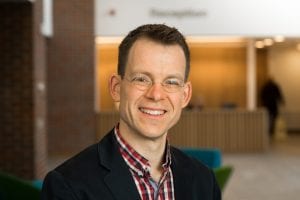Dr Stephen Pihlaja awarded funding for ‘Language and Religion in the Superdiverse City’ project

Reader in Stylistics and Lecturer in English, Dr Stephen Pihlaja has been awarded an Arts and Humanities Research Council (AHRC) Leadership Fellowship for a project which focuses on language and religion in Birmingham.
The AHRC Leadership Fellows Scheme is designed to develop and promote research leaders – individuals who set research agendas, lead research communities, provide intellectual leadership in their own disciplines and beyond, have a transformative impact on their subject area, and also act as advocates for the value and benefits of arts and humanities research to publics beyond academia. The Scheme offers opportunities for researchers to work in partnership with the AHRC in strengthening leadership capacity and capabilities in the arts and humanities.
With metropolitan areas in the UK experiencing unprecedented demographic changes in the past twenty years, some places such as Birmingham can be described as ‘superdiverse’, meaning that the populations have become so diverse that no one group is a clear majority.
Dr Pihlaja explains “Religious differences have been seen as a site for conflict in these cities, with differences in religious belief and practice being a barrier for communities to work together. Although there has been a great deal of research looking at the language use that occurs between people in these communities, no one has specifically examined how religious identity influences how people talk and communicate within these contexts. Because what people believe is a core part of their identity, understanding its specific role in superdiverse contexts is important to help people from different religious backgrounds work together in their communities.”
Dr Pihlaja’s project, entitled ‘Language and Religion in the Superdiverse City’ looks at the relationships which exist between language use and religious identity in superdiverse environments. The project will investigate not only what people say about their experiences of religious diversity, but how they interact with each other, and will be set in the superdiverse city of Birmingham, building on existing collaborative partnerships between Dr Pihlaja and Citizens UK, an alliance of civil society associations.
Building on Newman University’s longstanding relationship with Citizens UK, Dr Pihlaja will work with associations where religious belief and practice play a significant role in the associations’ motivations or among the membership. He will gather primary data through participation in the activities of partner associations, listening to community members and leaders’ experiences in interviews and focus groups. After gathering the data, he will work with members in these associations to co-produce a resource to help people talk productively about their faith.
‘Language and Religion in the Superdiverse City’ will provide evidence for community organisers and leaders, teachers, and civil authorities to set priorities based on real data, and investigate how effectively and inclusively talking about religious identity might empower people to value themselves and those around them. The project begins in June 2021 and will run for 18 months.
